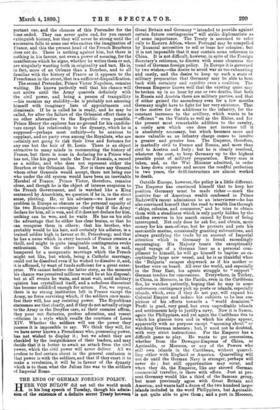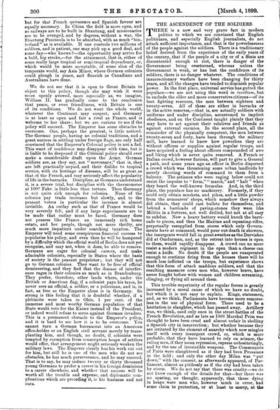THE ENDS OF GERMAN FOREIGN POLICY. II ERR VON BULOW did
not tell the world much in his long speech of Tuesday, though his admis- sion of the existence of a definite secret Treaty between Great Britain and Germany "intended to provide against certain future contingencies" will strike diplomatists as of some importance. The Treaty is assumed to refer only to Eastern Africa, where Portugal may be compelled by financial necessities to sell or lease her colonies ; but it is not impossible that it may contain some reference to China. It is not difficult, however, in spite of the Foreign Secretary's reticence, to discern with some clearness the trend of German foreign policy. In Europe it is governed by two wishes,—the desire to avoid war as too exhausting and costly, and the desire to keep up such a. state of military preparation that Germany may be able to beat back with certainty and rapidity even a coalition. The German Emperor knows well that the existing quiet may be broken up in an hour by one or two deaths, that both in Russia and Austria there are military parties, and that if either gained the ascendency even for a few months Germany might have to fight for her very existence. That is the motive for the additions to the infantry, for the constant increases to the artillery, which wants to be " efficient " on the Vistula as well as the Rhine, and, for the present most remarkable addition to the cavalry, a costly arm which one does not increase till it is absolutely necessary, but which becomes more and more valuable as an infantry charge comes to involve a greater and greater loss. The Emperor, therefore, is markedly civil to France and Russia, and more than civil to Austria and Italy ; but he is clearly resolved, whatever the cost, to keep Germany up to the highest possible point of military preparation. Every man is taken, and, as the War Minister admitted, in order to keep down expense and secure the needful perfection in two years, the drill-instructors are almost worked to death.
Outside Europe, however, the policy is a little different. The Emperor has convinced himself that to keep her position Germany must be made richer—mark the positive fear of American wealth confessed in Prince Radziwill's recent admissions to an interviewer—he has also convinced himself that the road to wealth lies through "ships, colonies, and commerce," and he tries to obtain them with a steadiness which is only partly hidden by the sudden swerves in his march caused by fears of being interrupted. Not only does he ask for, and obtain, more money for his men-of-war, but he protects and pets his mercantile marine, occasionally granting subventions, and always gratifying the trade by an amount of Imperial attention which in Germany is found exceedingly encouraging. His Majesty treats the exceptionally rapid voyage of a German liner as a personal com- pliment to himself, he will go himself to baptise an ex- ceptionally large new vessel, and he is as thankful when the ' Bulgaria ' escapes shipwreck as if his mother or brother were on board. All over the world, and especially in the Near East, his agents struggle to " support " German tenders for concessions. Everywhere, in Turkey, in China, in Morocco, in the Pacific, even in the Caribbean Sea, he watches patiently, hoping that he may in some unforeseen contingency pick up posts or islands, especially islands, which, even if they do not pay, will expand his Colonial Empire and induce his subjects to 'be less sus- picious of his efforts towards a "world dominion." Profit is good, very good, but even unprofitable islands and settlements help to justify a navy. Now it is Samoa, again the Philippines, and yet again the Caribbean Sea to which his glances turn and in which his ships appear, apparently with no purpose except "mooning about" or watching German interests ; but, it need not be doubted, with very strict instructions. For the Emperor has a difficult game to play. He wants to get concessions, whether from the Dowager-Empress of China, or Aguinaldo, or Morocco, or any of the Powers who still own islands in the Caribbean, without quarrel- ling either with England or America. Quarrelling will not do until the German Navy is stronger, perhaps will never do ; but still opportunities may occur, and when they do, the Emperor, like any shrewd German commercial traveller, is there with offers. Just at pre- sent Germany would like a third of the Samoan group, but must previously agree with Great Britain and America; and wants half a dozen of the two hundred larger islands included in the word Philippines, but Aguinaldo is not quite able to give them ; and. a port in Morocco, but for that French quiescence and Spanish favour are equally necessary. In China the field is more open, and so railways are to be built in Shantung, and missionaries are to be avenged, and by degrees, without a war, the Shantung Peninsula is to be absorbed, with as much "hin- terland" as is available. If one controls two millions of soldiers, and is patient, one may pick up a good deal, and some day—who knows ?—the opportunity may arrive for a bold, big stroke,—for the attainment, that is, either of some really large tropical or semi-tropical dependency, or, which would be more acceptable, of some slice of the temperate world, say Asia Minor, where German colonists could plough in peace, and flourish as Canadians and Australians have done.
We do not see that it is open to Great Britain to object to this policy, though she may wish it were more openly avowed, more especially as, we imagine, William II. has gradually come to the conclusion that peace, or even friendliness, with Britain is one of its conditions. We do not want the whole world, whatever the Continent may suspect, and Germany is at least as open and fair a rival as France, and is welcome to her share ; but we are curious to see if the policy will succeed. The Emperor has some obstacles to overcome. One, perhaps the greatest, is little noticed. The German people, having no colonial traditions, and a great success in settling under foreign flags, are only half convinced that the Emperor's Colonial policy is not a fad. This want of confidence may disappear with time, but it is liable to be deepened if the Colonial policy should ever make a considerable draft upon the Army. German soldiers are, as they say, not "mercenary," that is, they are left practically unpaid, and their dislike to tropical service, with its heritage of diseases, will be as great as that of the French, and may seriously affect the popularity of life in the barracks. Discipline, as Germans understand it, is a severe trial, but discipline with the thermometer at 100° Fahr. is little less than torture. Then Germany is not quite rich enough for colonies. None of the colonies pay trade increases but slowly, and to the peasant voters in particular the increase is almost invisible. An outlay such as that of France would be very severely felt, and if any large experiments are to be made that outlay must be faced. Germany does not possess like France an immensely rich home estate, and her people, though not more thrifty, are much more impatient under searching taxation. The Emperor will need some conspicuous financial success to popularise his policy, and even then he will be hampered by a difficulty which the official world of Berlin does not yet recognise, and may not, when it does, be able to remove. Germans are eager for colonial careers, and make admirable colonists, especially in States where the basis of society is the peasant proprietor ; but they will not go to German colonies. They want to be free of official domineering, and they find that the disease of interfer- ence rages in their colonies as much as in Brandenburg. They prefer, therefore, other lands where, under the British or American flag, if a colonist pays his taxes, he never sees an official, a soldier, or a policeman, and is, in fact, as free as the Emperor alone is in Germany. So strong is this feeling that it is doubtful whether, if a plebiscite were taken in Ohio, 1 per cent. of the immense and most worthy German population of that State would vote for the Kaiser instead of the President, or indeed would refuse to serve against German invaders. This is a permanent obstacle to the Emperor's policy, and it is hard to see how it is to be overcome. You cannot turn a German bureaucrat into an American office-holder or an English civil servant merely by trans- planting him, and though, no doubt, if. colonists were tempted by exemption from conscription heaps of settlers would offer, that arrangement might seriously weaken the military laws. The Emperor clearly has his work cut out for him, but still he is one of the men who do not see obstacles, he has much perseverance, and he may succeed. That is to say, he may induce twenty or thirty thousand young Germans to prefer a career in his foreign dominions to a career elsewhere, and whether that success will be worth all the trouble and expense, and diplomatic com- plications which are preceding it, is his business and not ours.







































 Previous page
Previous page